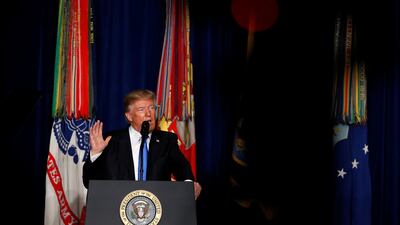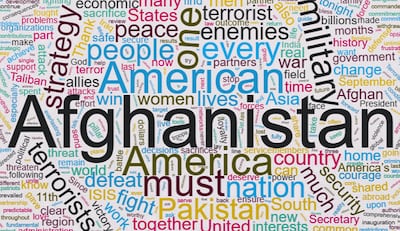In a speech that was short on detail but hawkish in message and approach, Donald Trump unveiled his strategy for the 16-year war in Afghanistan, promising the American people “a win” that would “obliterate ISIL, crush Al Qaeda, and prevent the Taliban from taking over the country”.
The US president, speaking to the nation in a prime-time address from the Fort Myer military base in Virginia on Monday night, took ownership of the war in Afghanistan that his two predecessors — Barack Obama and George W Bush — failed to end and laid out a more aggressive strategy.
“My original instinct was to pull out, and historically I like following my instincts, but all of my life I heard that decisions are much different when you sit behind the desk in the Oval Office,” Mr Trump said in an attempt to justify a reversal in course from a candidate who wanted to withdraw from the war to a president now authorising an increase in US troops.
While Mr Trump did not give any specifics to the number of US troops he will be adding to the 8,400 already deployed there, the Washington Post reported that the administration told "congressional officials it will be [adding] about 4,000 [troops]". The number is consistent with what defence secretary James Mattis requested earlier in summer.
Thematically, Mr Trump stuck with a campaign promise of not releasing details on military planning or announcing timetables for withdrawal.
“We will not talk about numbers of troops, conditions on the ground not arbitrary timetables will guide our mission,” he said.
____________
Read more:
Trump presidency calls for global front against chemical weapons after criticisms of his predecessor
Bush, Obama and now Trump: a history of US presidential announcements on the Afghan war
____________
He did, however, grant the US military more freedom in conducting the war with less oversight from Washington.
“I have already lifted restrictions the previous administration placed on our war fighters … micromanagement from Washington, DC does not win battles,” the US president said.
The speech was extraordinarily tougher on Pakistan, which Mr Trump accused of harbouring terrorists and sowing instability in neighbouring Afghanistan.
"We can no longer be silent about Pakistan's safe havens for terrorist organisations.
"We have been paying Pakistan billions and billions of dollars at the same time they are housing the very terrorists that we are fighting," he said, referencing the annual foreign aid from Washington to Islamabad and which shrunk to $1 billion (Dh3.6bn) in 2016.
Mr Trump called on Pakistan to change its behaviour “immediately … it is time for Pakistan to dedicate to civilisation and order and peace”.
In what is likely to further infuriate Pakistan, the US president appealed to its historic foe, India, seeking its help in areas of development, security and aid in Afghanistan.
Mr Trump drew lessons from the “hasty withdrawal” in Iraq in 2011, warning that repeating it in Afghanistan “would create a vacuum that terrorists — including ISIL and Al Qaeda — would instantly fill”.
“Our troops will fight to win,” he said, highlighting the US goals as “attacking our enemies, obliterating [ISIL], crushing Al Qaeda, preventing the Taliban from taking over the country, and stopping mass terror attacks against Americans before they emerge”.
The US president referenced his speech in Saudi Arabia last May to renew a commitment "to stripping terrorists of their territory, cutting off their funding, and exposing the false allure of their evil ideology”.
"Terrorists who slaughter innocent people will find no glory in this life or the next. They are nothing but thugs, and criminals, and predators, and losers," he said.
The speech earned praise from Republicans in Congress, including Senator John McCain, who said it was “a step in the right direction”.
“This strategy is long overdue, and in the interim, the Taliban have made dangerous inroads. Nevertheless, I believe the president is now moving us well beyond the prior administration's failed strategy of merely postponing defeat,” he added.
Meanwhile, Senator Jack Reed, a Democrat, criticised the speech for being “short on the details our troops and the American people deserve and very vague”.
Mr Reed called for “more attention and resources on diplomatic efforts”, warning that “the State Department is understaffed and underutilised and president Trump wants to slash its budget and foreign aid further”.
The speech stood in sharp contrast to Mr Trump’s past rhetoric where he occasionally tweeted about withdrawing from Afghanistan.
In January 2013, he tweeted: “Let’s get out of Afghanistan. Our troops are being killed by the Afghanis we train and we waste billions there. Nonsense! Rebuild the USA.”
Again in March, 2013, he advocated an isolationist message, saying: “We should leave Afghanistan immediately. No more wasted lives. If we have to go back in, we go in hard & quick. Rebuild the US first.”
A recent poll conducted by the Morning Consult and Politico showed that only 23 per cent of Americans believe the US is winning the war there, and 38 per cent who believe the US is losing.
The same poll showed that 37 per cent of Americans support gradual withdrawal from Afghanistan, while 24 per cent support the status quo and only 20 per cent support increasing the troop level numbers.
More than 2,000 US soldiers have died in Afghanistan, and the civilian death toll has well surpassed the 31,000 figure, according to Brown University.



